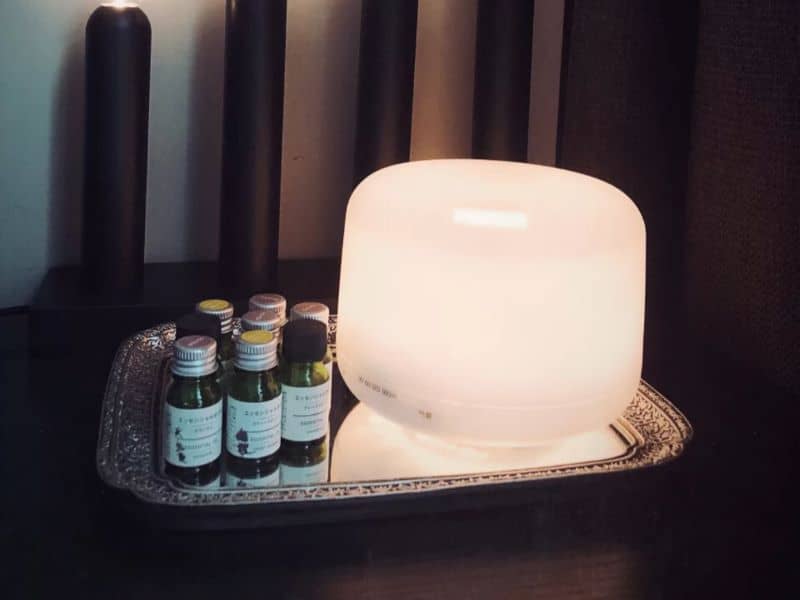For most people, diffuser mist is one of the best ways to experience aromatherapy and fragrance your home. Besides freshening up the place, they can help fight germs, improve concentration, and bring calm into the environment.
But there are some instances when using a diffuser can be bad for your lungs. If you have allergies, some diffused oils might trigger an allergic reaction. These particles might irritate or worsen the condition of a person with a pre-existing respiratory illness.
Although diffusing essential oils is generally safe and even healthy, this post outlines precautions to consider and what to avoid altogether if you’re concerned about your lungs.

Are Diffusers Bad for Those with Allergies?
Since essential oils are biological matter, they can cause an allergic reaction similar to what you might experience if you were standing in a garden at the height of allergy season.
All the usual symptoms: sneezing, watery and/or itchy eyes, coughing or congestion, and a runny nose, may ail you. For some people, allergic reactions also affect the lungs.
In this scenario, the diffuser itself isn’t bad for your lungs, it’s the kind of essential oils being diffused that are causing the allergic reaction.
One solution would be to clean out your diffuser, and then drop in oils that don’t typically trigger your allergies. Unfortunately, this might require trial and error, and irritation before you can settle on oils that won’t irritate you.
Are Diffusers Bad for Asthma Conditions?
Asthma is a long-term medical condition that makes it difficult for air to move in and out of your lungs. Just as individuals are different from one another, asthma symptoms and triggers can vary from person to person.
Still, there are common triggers that are likely to affect most people with asthma. The Center for Disease Control (CDC) lists fragrances, sprays, allergies, and mold amongst the culprits. Air quality is one of many additional triggers that Asthma.com adds to the list.
Fragrances as Triggers
The exact fragrances that can trigger an asthma attack will also vary by person. But if you have asthma and know that strong odors might lead to an asthma attack, then it would be best to avoid using essential oil diffusers.
If you must use a diffuser, adding fewer than the usual drops into an ultrasonic diffuser may fare better than inhaling the highly concentrated oils from a nebulizing diffuser.
Sprays as Irritants
You might enjoy diffusing oils and are able to tolerate fragrances, but are triggered by sprays and mists. If this is you, then make sure that your diffuser operates on the opposite side of the room or in a different room altogether.
The further away you are from the mist released by the diffuser, the less likely you are to trigger an attack.
Allergies for Those with Asthma
A person without asthma might experience eye irritation, sore throat, and a runny nose if they inhale the mist of an essential oil that typically triggers seasonal allergies.
These symptoms are more severe for individuals with asthma. Seasonal allergies can swell and contrict the airway passage of an asthma sufferer. This makes it difficult to breathe and can lead to a full-on asthma attack.
If you know which plants lead to seasonal allergy symptoms, avoid diffusing those oils.
Mold as a Trigger
This fungus can be harmful to anyone, but mold is especially bad for those with asthma. Whether or not you’re allergic to mold, as an asthma sufferer, breathing in mold can cause an asthma attack.
As explained in this post, mold can build up in ultrasonic diffusers if they aren’t properly maintained.
So another way to protect your lungs when using a diffuser is to clean it regularly.
Air Quality Can Be a Factor
We usually only hear this with regards to incense and candles but proper ventilation is also important when using essential oil diffusers. Keep vents open and if necessary, open a window or door.
Essential oils can release irritating organic substances into the air when diffused. Too much exposure to essential oils can lead to an allergic reaction and trouble breathing. It’s best to limit exposure to these oils, even when they’re of high quality.
It would be helpful to make use of the intermittent function on your diffuser to avoid overexposure. Spacing out the timed release can limit or prevent irritation.
Are Diffusers Bad for Other Respiratory Illnesses?
There are a number of additional respiratory diseases and illnesses that might be affected by diffuser use.
Chronic Obstructive Pulmonary Disease (COPD), bronchitis, pneumonia, emphysema, cystic fibrosis, or other respiratory illnesses must be considered before using a diffuser for yourself or those with any of these conditions.
Similar to asthma, certain scents and the presence of smoke can cause a COPD flare up. Although the mists and vapors produced by diffusers aren’t technically smoke, they’re similar enough to potentially harm a person with sensitive lung conditions.
Diffusing eucalyptus and peppermint oils led to an inflamed bronchial wall for one patient. But these patients with upper respiratory tract infections experienced temporary relief from diffused oils.
If you experience increased shortness of breath, wheezing, coughing, or any symptoms related to your condition, stop using your diffuser and contact your medical doctor. Speaking to your physician about essential oil usage can help clarify what might be causing the reaction.
Some research suggests that Eucalyptus and other oils containing 1,8-cineole compound might help treat COPD and even alleviate asthma symptoms. Further research on this topic has proved promising but there’s still a lack of evidence to officially suggest that diffusers be used as part of a treatment regimen.
Anti-inflammatory oils like frankincense, myrrh, and orange oil also show promise, but again, nothing definitive.
Generally speaking, diffusing some essential oils can irritate your lungs and mucous membrane while others might actually soothe your bodily systems.
Even though a large portion of the population can have the same medical condition, the way that each person experiences it will be different. It is always best to consult with your physician before using a diffuser especially if you’ve been diagnosed with a respiratory illness.
Could a Diffuser Harm My Lungs?
Diffusers disperse tiny essential oil molecules into the air. These tiny molecules appear in the form of a mist that travels throughout your home, into your lungs, down through your bloodstream, and throughout bodily organs and systems.
So it makes sense to be concerned with how using a diffuser might affect your lungs. Here’s a little information about how diffusers work, which might help you determine whether using them would be best for you.
Ultrasonic Diffusers: Brief Overview
Easily becoming the most common diffusers on the market, ultrasonic diffusers seem to have replaced heat diffusers altogether. This is because heat can destroy essential oils’ useful health properties.
Ultrasonic diffusers are electric devices that use water and a vibrating plate. This plate produces ultrasonic waves that break down and disperse essential oil particles as a cool mist – keeping the oil quality intact.
The debate here is whether the water makes the oils less potent. But an upside is that most ultrasonic diffusers also function as a humidifier. Adding moisture into the air can lubricate the throat and nasal passage, as well as prevent eye, skin, and lip dryness. This function might actually help those with lung conditions.
Nebulizing Diffusers: Brief Overview
For pure, undiluted essential oil dispersion, nebulizing diffusers have a growing presence in the market.
Using only essential oils and an electric pump, the oils are atomized into an even finer mist than the one produced by ultrasonic diffusers. It’s a more concentrated release for thinner oils, making them more like a vapor than a mist.
Thicker oils, like sandalwood, patchouli, blue tansy, and valerian would not work well in a nebulizing diffuser. Since water isn’t used, you also wouldn’t experience the humidifying function.
Essential Oil Quality Plays a Role
As powerful plant essences, essential oils are only as beneficial as the purity and quality of the oil. The kind of oils you add to your diffuser can impact your health.
Some companies add synthetic materials to their oils or dilute them but pass the mixture off as essential oils. Inhaling unnatural ingredients can create all kinds of adverse effects. These fragrance oils do not offer any aromatherapy or respiratory benefits.
Takeaway: In order to reap the most benefit from inhaling diffused oils, only use high quality diffusers and pure essential oils. Keeping your essential oil diffuser clean, can also prevent symptoms from worsening or developing.
Final Thoughts
Everyone reacts differently to essential oil as it’s diffused. Operating a clean diffuser won’t likely harm the lungs if those without a pre-existing health condition.
Those with respiratory illnesses must monitor their exposure to essential oil mists much more closely. You have to pay attention to which oils you diffuse and for how long.
If you experience respiratory distress after using a diffuser, turn off the diffuser, get some fresh air if you can, and then seek medical attention.
